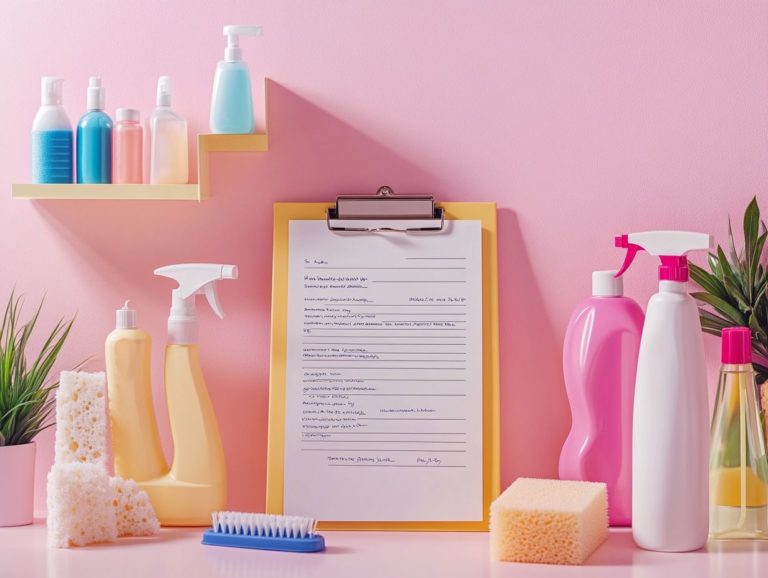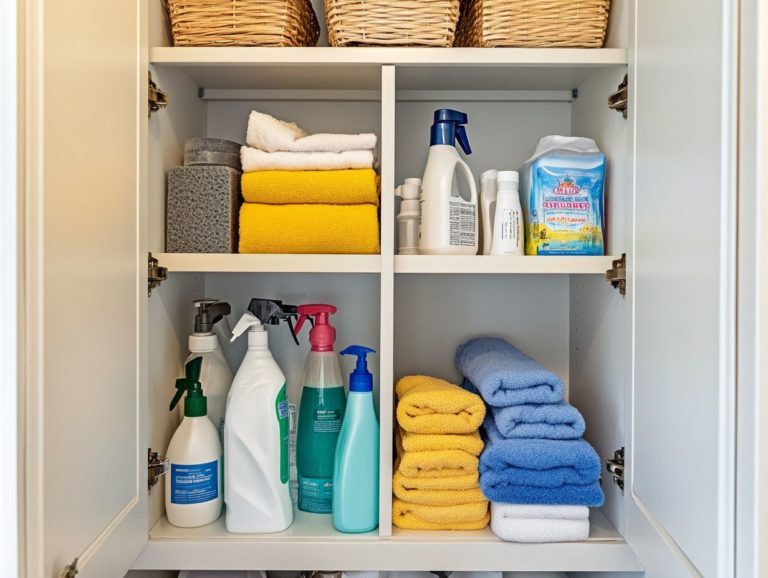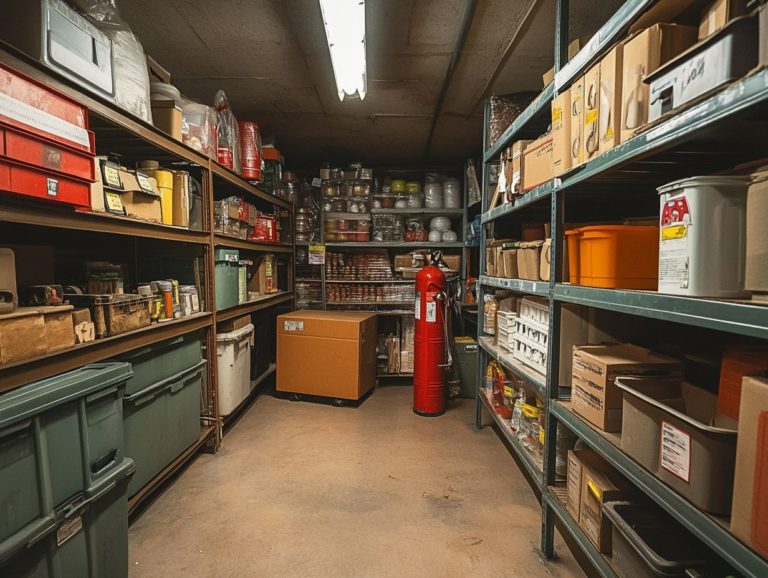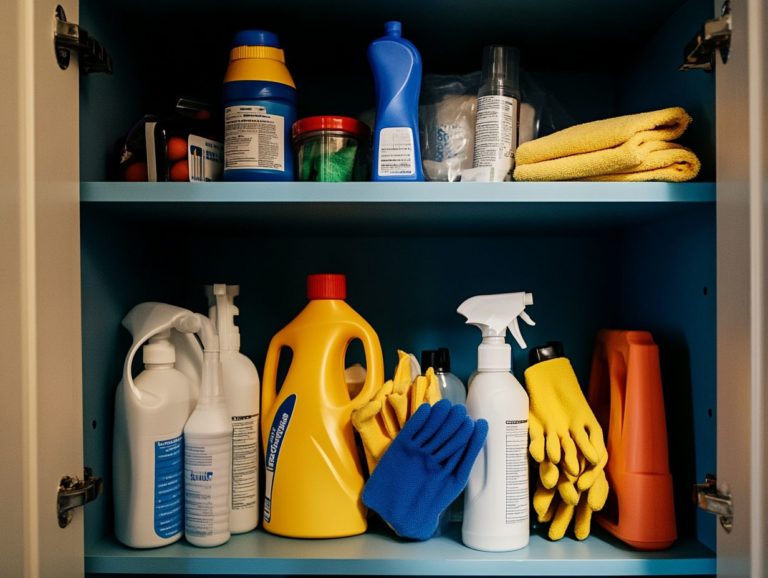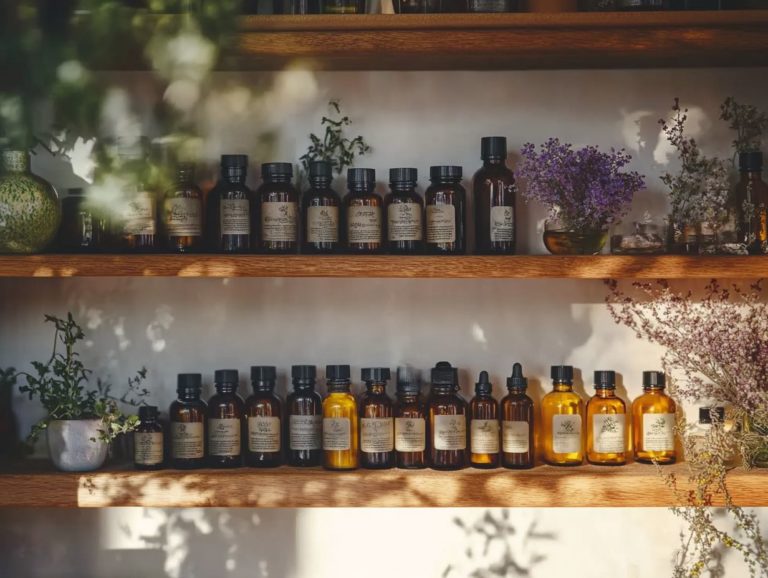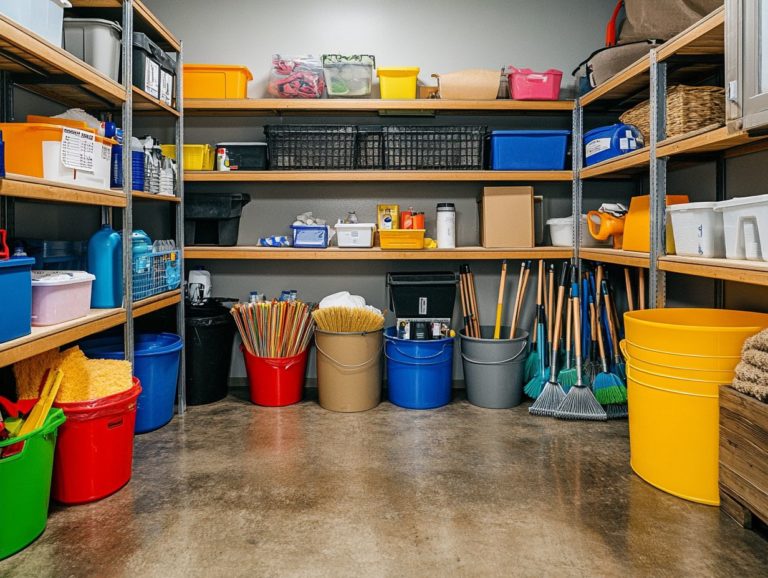How to Store and Preserve Natural Cleaners
Natural cleaners are becoming increasingly popular as eco-friendly alternatives to traditional cleaning products. They allow you to create a healthier home and environment. These natural cleaning products can be easily found in stores like Walmart, which offer a wide range of options to fit your needs.
This article delves into what natural cleaners are and the benefits they offer. You will also find essential tips for storing and maintaining their effectiveness. Explore common ingredients like vinegar and baking soda, along with proper storage methods to ensure your natural cleaning solutions remain strong and effective. We will also cover some top spring cleaning tips to maximize efficiency in your cleaning routine.
Unlock the secrets to a sparkling clean home today while embracing sustainability! Learn how to store cleaning supplies efficiently to avoid a cluttered cleaning cabinet and ensure easy access.
Contents
- Key Takeaways:
- What Are Natural Cleaners?
- Why Should You Use Natural Cleaners?
- How to Store Natural Cleaners?
- How to Preserve Natural Cleaners?
- What Are Some Common Natural Cleaners and How to Store Them?
- How Long Can You Store Natural Cleaners?
- Frequently Asked Questions
- Can natural cleaners be stored for long periods of time?
- What is the best way to store natural cleaners and under-the-sink solutions?
- Can I mix different natural cleaners or chemical-based cleaning products together for storage?
- How can I prolong the shelf life of natural cleaners?
- Is it safe to store natural cleaners in plastic containers?
- Are there any natural preservatives I can use for my homemade cleaners?
Key Takeaways:
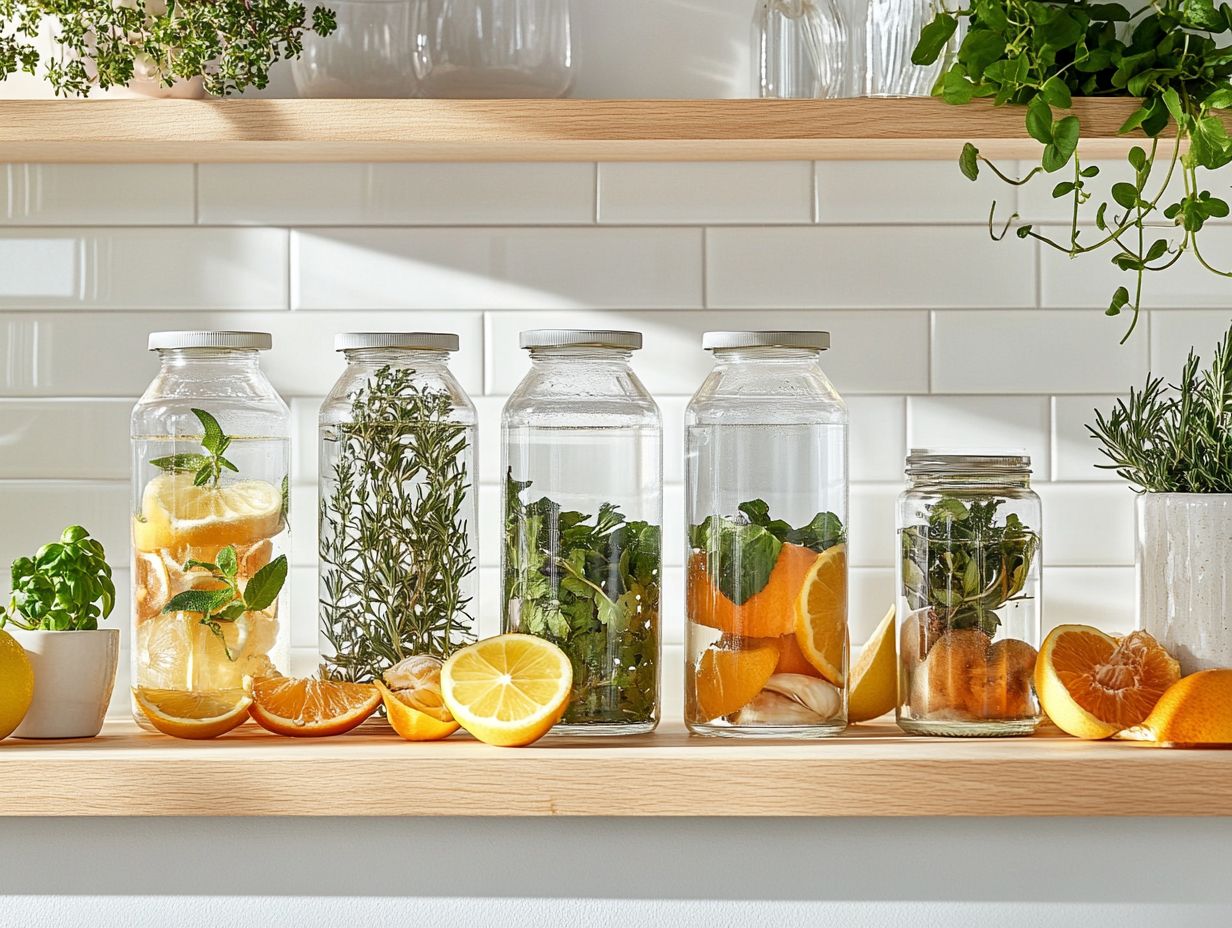
- Store natural cleaners in a cool, dry place away from heat and sunlight to maintain their strength. Consider utility room ideas, such as installing adjustable cabinet shelving for vertical storage options, to keep your cleaning supply organization optimal.
- Preserve natural cleaners by using airtight containers, avoiding contamination, and following proper dilution ratios. Utilizing child safety locks on cabinets where cleaners are stored can further ensure safety, especially in homes with children and pets.
- Common natural cleaners, such as vinegar, baking soda, lemon juice, and essential oils, can be stored for different lengths of time. Keeping a detailed cleaning product inventory can help you track how long the products last and their usage.
What Are Natural Cleaners?
Natural cleaners are crafted from non-toxic and biodegradable ingredients. This ensures safety for both children and pets while delivering impressive results in your household cleaning endeavors. Embracing these DIY non-toxic cleaning solutions can significantly reduce harmful exposure in your home.
These products typically feature natural elements like vinegar, baking soda, and essential oils. They tackle grime and dirt effectively while promoting a healthier indoor atmosphere. For best results, organize your cleaning supplies using transparent containers and a portable cleaning caddy for easy access.
Unlike conventional chemical-based cleaners, natural options significantly lower the risk of harmful exposure. They are ideal for anyone aiming to embrace DIY non-toxic cleaning solutions within their home.
Why Should You Use Natural Cleaners?
Embracing natural cleaners presents a multitude of advantages over conventional cleaning products. This is especially true regarding safety and environmental impact. For families with children and pets, the importance of safe cleaning solutions cannot be overstated, as traditional chemical-based cleaners can pose significant health risks.
Natural cleaning products not only reduce these dangers but also enhance cleaning efficiency. By leveraging the capabilities of effective ingredients such as vinegar and baking soda, they tackle grime effectively without resorting to harsh chemicals.
How to Store Natural Cleaners?
Storing natural cleaners effectively is crucial for maintaining their strength and ensuring safety, particularly in homes with children. A well-organized cleaning product inventory prevents cluttered cabinets and allows you to easily access essential products whenever necessary.
Utilizing transparent containers for storage, complemented by a portable cleaning caddy or under-the-sink solutions, enhances accessibility and promotes efficient use of your cleaning arsenal. Labeling and dating your cleaners ensures that you re always using them within their optimal lifespan, maximizing both effectiveness and safety in your cleaning routine.
Start using natural cleaners today for a healthier home!
1. Keep Away from Heat and Sunlight
To ensure the longevity and effectiveness of your natural cleaning products, it s essential to keep them away from heat and direct sunlight. High temperatures and UV light can degrade many of the ingredients, making them less effective or even harmful. This is especially true compared to chemical-based cleaning products that often contain stabilizers.
When you expose natural cleaning solutions to these environmental factors, they may lose their effectiveness. This can result in subpar cleaning performance or even microbial growth. Not only does this undermine their cleaning power, but it can also compromise safety. Using proper storage solutions, like over-the-door storage, can help mitigate these risks and keep your cleaning supplies organized.
For optimal preservation, think about storing these products in cool, dark places such as a sealed cabinet or pantry, away from heat-emitting kitchen appliances. Try to maintain a consistent temperature and avoid basements with fluctuating conditions and moisture risks.
By safeguarding the integrity of your eco-friendly cleaners, you ensure they perform as expected while contributing to a clean and safe home environment.
2. Store in a Cool and Dry Place
Natural cleaning products deserve a proper home. Always store them in a cool, dry place to maximize their shelf life and effectiveness. Humidity can cause certain ingredients to clump together or react poorly. This is why having a well-organized utility room with a portable caddy is crucial for maintaining an efficient inventory of your cleaning supplies.
Creating a dedicated area that s well-ventilated and protected from direct sunlight will help prevent moisture build-up, ensuring that your eco-friendly cleaners remain potent and ready for action. To enhance organization in your utility space, consider using clear bins or labeled containers. This way, you can easily identify and access your natural cleaning solutions without hassle, keeping your space tidy and organized!
Consider installing shelving units to elevate your products off the floor, reducing the risk of contamination from spills and condensation. Such thoughtful storage practices streamline your cleaning process and extend the life of your natural cleaners, ensuring they perform effectively when it s time to tackle those household chores. Additionally, incorporating vertical storage options can help you maximize space and keep your laundry room or utility room organized.
3. Label and Date Your Cleaners
Labeling and dating your natural cleaners is not just a best practice; it s a smart strategy that enhances both safety and efficiency in your cleaning routine. By clearly marking each product, you can easily keep track of what s inside while ensuring that you re using everything within its effective time frame. This is especially crucial when children are around, as it significantly reduces the risk of using expired solutions.
This smart approach not only safeguards your home but also supercharges your cleaning routine! Be sure to include essential information on each label, such as the product name, ingredients, and specific usage instructions. This way, anyone can easily identify and utilize the cleaners correctly, ensuring everyone’s safety and maintaining cleaning efficiency.
Maintaining an organized inventory of your cleaning products becomes an invaluable resource. Make it a habit to record the expiration dates of your supplies, ensuring that you always have safe and effective solutions at hand. This method keeps your space tidy and organized while empowering you to streamline your cleaning tasks, guaranteeing that every product you grab is both fresh and effective.
How to Preserve Natural Cleaners?
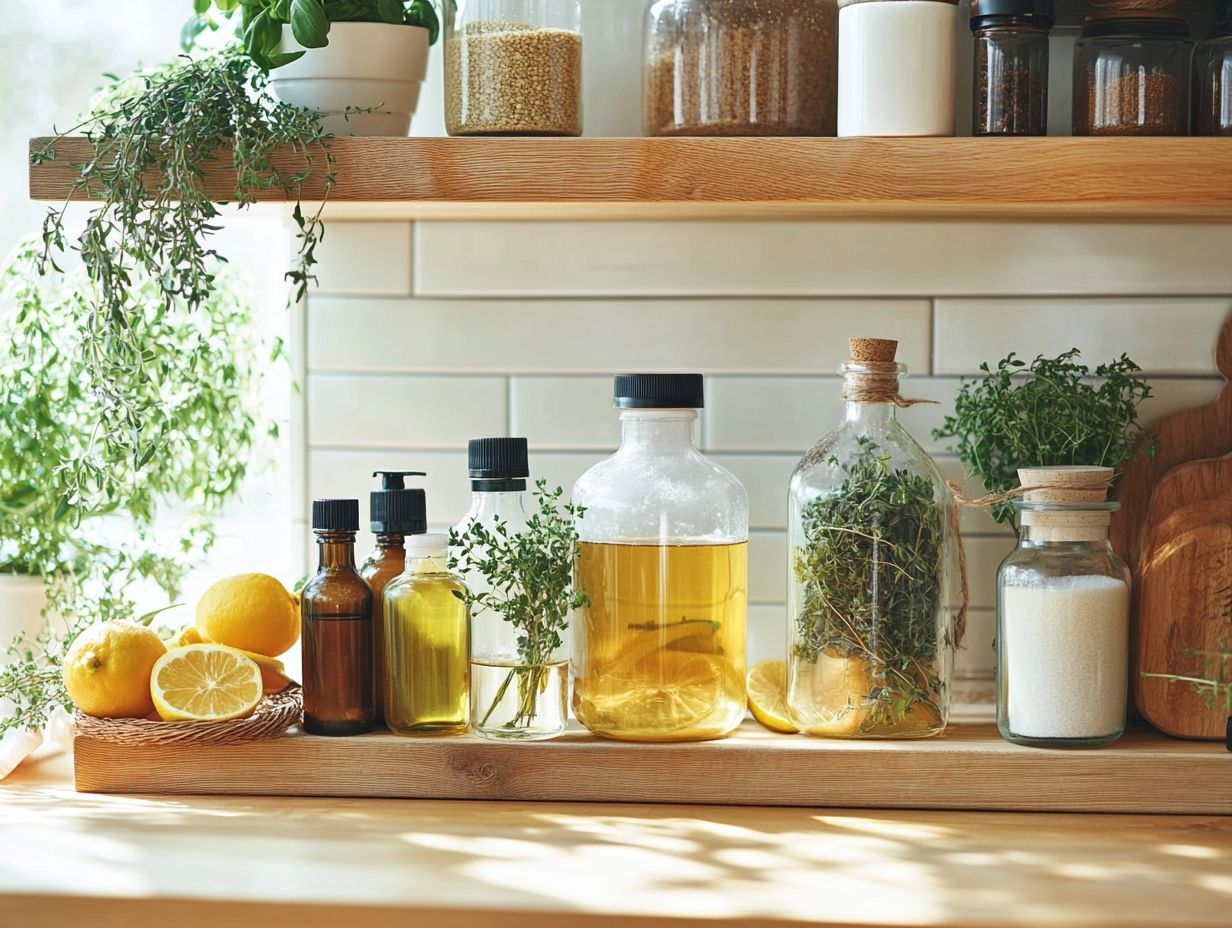
Preserving the integrity and effectiveness of your natural cleaners is essential for achieving safe and efficient cleaning results. One of the best ways to prevent contamination and ensure that the natural ingredients retain their potency is to use airtight containers.
It’s crucial to understand and follow proper dilution ratios. This not only maintains the effectiveness of your cleaners but also protects surfaces and keeps children safe from overly concentrated solutions.
Start preserving your cleaners today, and enjoy a cleaner, safer home tomorrow!
1. Use Airtight Containers
Utilizing airtight containers for your natural cleaning products is essential for preserving their effectiveness and preventing contamination. These containers are your first line of defense against exposure to air and moisture. Plus, they help you keep your cleaning supply inventory beautifully organized!
Experts like Lucy Searle and Andrea Brame often recommend this practice for maintaining the potency of your eco-friendly solutions. By preventing oxidation and evaporation, airtight containers ensure that the essential oils and other active components in your cleaning solutions maintain their potency over time.
When your products are shielded from light, heat, and humidity, their shelf life is significantly extended. This makes your household more economical by minimizing waste. Consider looking for these storage solutions at Homes & Gardens or online retailers for high-quality options.
If you re in the market for high-quality airtight containers, look to reputable kitchen and home supply stores, or explore online retailers that specialize in storage solutions. Incorporating these containers into an organized strategy for your cleaning supplies is easy just label them for quick identification!
Expert advice from figures like Kim Corey can provide additional insights into effective cleaning supply organization. Isn t it time to give your cleaning supplies the best care possible?
2. Avoid Contamination
Avoiding contamination of your natural cleaning products is crucial for maintaining their safety and effectiveness. You can achieve this by steering clear of contaminated tools. This means no mixing different chemical residues and ensuring that your containers are spotless before refilling them with your natural cleaners.
To keep things clean, wash any utensils or surfaces used during the preparation of these products thoroughly. Using hot, soapy water followed by a rinse with vinegar can effectively eliminate any lingering contaminants.
Opting for storage containers specifically designed for natural products, ideally glass or stainless steel, will further protect against chemicals getting into your products. Such cleaning supply organization practices are vital for maintaining a safe and efficient cleaning routine.
Regularly inspecting these containers for signs of wear or contamination is also essential for preserving product integrity. By incorporating these mindful practices, you not only enhance the effectiveness of your cleaners but also contribute to a healthier home environment.
Keeping an organized cleaning supply inventory ensures that you can easily track and maintain your natural cleaning products. Act now to protect your family and keep your home safe from contaminants!
3. Use Proper Dilution Ratios
Using the right mix of cleaning products with water is essential when using natural cleaning products. This ensures maximum effectiveness while prioritizing safety, particularly in homes with children or pets. Striking the right balance can significantly enhance your cleaning efficiency and prevent potential damage to surfaces.
For example, popular natural cleaners like vinegar and baking soda typically require specific dilution ratios to perform at their best. A common mixture for all-purpose cleaning might be one part vinegar to four parts water, which optimally enhances its ability to cut through grime without being overly harsh.
Conversely, using a solution that is too concentrated can lead to risks such as skin irritation or damage to delicate materials. By adhering to recommended dilution guidelines, you not only boost the power of these natural cleaners but also safeguard your home environment.
This ensures that safety remains a top priority in all your cleaning endeavors. Start organizing your cleaning supplies today for a fresher, safer home!
What Are Some Common Natural Cleaners and How to Store Them?
Common natural cleaners comprise everyday items such as vinegar, baking soda, and essential oils. Each possesses distinct cleaning properties tailored to meet your household needs. Organize cleaning supplies effectively to ensure they are readily accessible.
It is essential to understand the proper storage methods for these natural cleaning products. This not only maintains their potency but also ensures safety, especially in homes with children and pets. Consider using child safety locks to prevent accidental access.
For instance, you should store vinegar in a cool, dark place, while essential oils need to be kept in airtight containers to preserve their aromatic qualities and cleaning effectiveness. Keeping a cleaning product inventory can help manage your supplies efficiently.
1. Vinegar
Vinegar is a versatile natural cleaner known for cutting through grease and eliminating odors. You ll be amazed at how effective it is! Keeping vinegar in a cool, dark place is ideal for maintaining its acidity and overall effectiveness.
This unassuming kitchen staple can handle a wide range of cleaning tasks, from disinfecting surfaces to banishing stubborn stains. If you’re eager to elevate vinegar s cleaning prowess, consider combining it with baking soda. This dynamic duo creates a fizzy reaction that can effectively unclog drains or scrub surfaces to a pristine finish.
Mixing vinegar with lemon juice enhances its stain-fighting power. For sparkling windows and mirrors, a one-to-one solution of vinegar and water achieves a streak-free shine. Always remember to store any mixed solutions in labeled, airtight containers to ensure they remain effective and safe for future use.
2. Baking Soda
Baking soda is an essential natural cleaning product, celebrated for its remarkable ability to deodorize and gently scrub surfaces. To store baking soda effectively, keep it in an airtight container to safeguard it from moisture and odors that can compromise its efficacy.
This simple yet versatile compound transcends its role as merely a deodorizer. It excels at tackling tough stains, unclogging drains, and refreshing carpets. When you mix baking soda with vinegar, you initiate a delightful fizzing reaction that helps dissolve grime in kitchens and bathrooms.
You can also combine it with essential oils, such as lavender or lemon. This not only boosts its deodorizing properties but also infuses your space with a delightful fragrance.
Remember, the longevity and effectiveness of baking soda are significantly influenced by proper storage. Exposure to air can diminish its potency over time. By using it wisely alongside other natural ingredients like lemon juice or castile soap, you amplify its cleaning power and contribute to a healthier home environment.
3. Lemon Juice
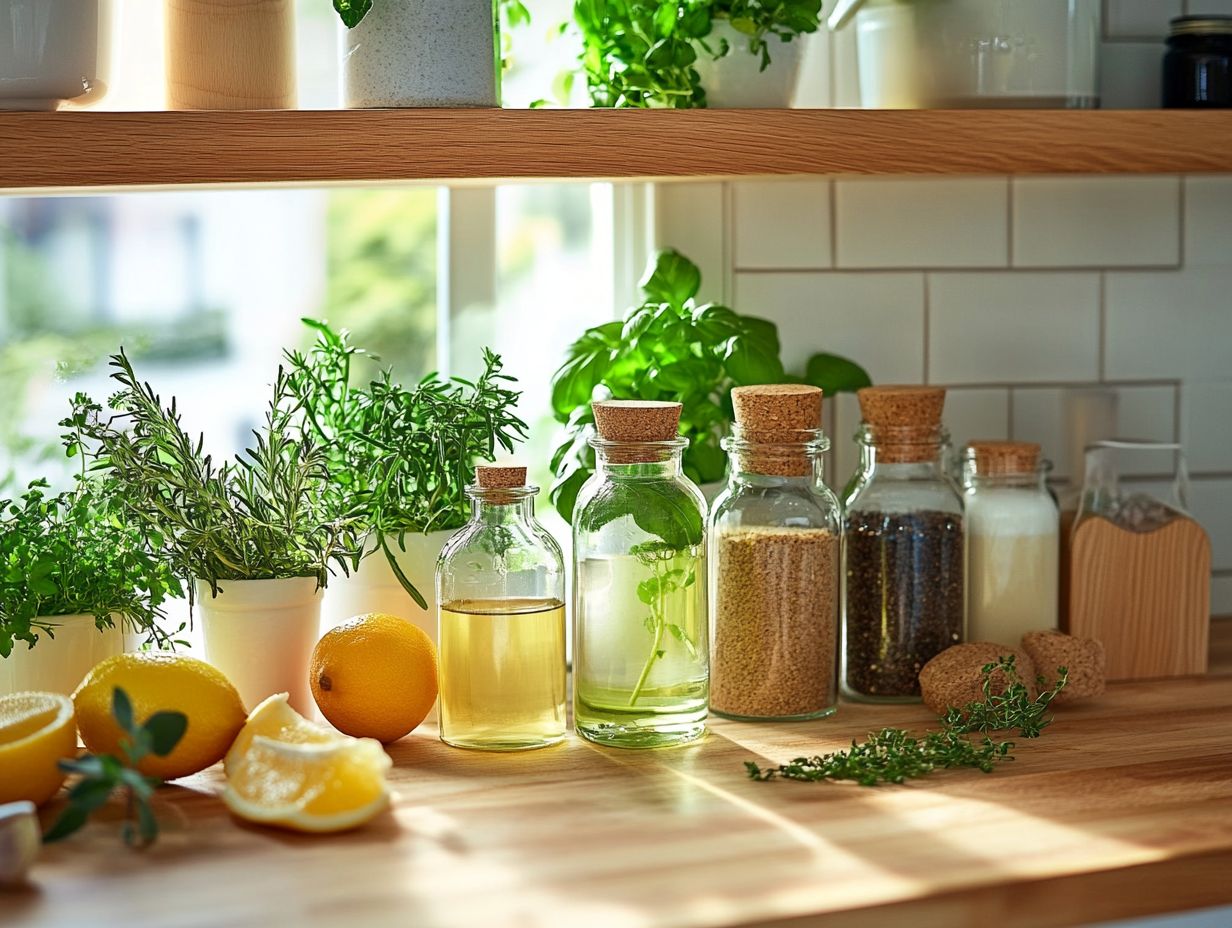
Lemon juice stands as a powerful natural cleaner, leveraging its acidic properties to lift stains and refresh surfaces, which is why it has become a favorite in DIY cleaning recipes. To ensure it remains at its peak freshness and cleaning effectiveness, store lemon juice in an airtight container in the refrigerator.
But lemon juice isn t just a solo act; it pairs beautifully with other natural ingredients like baking soda, enhancing its stain-fighting prowess, or vinegar, which delivers an impressive boost in disinfecting capabilities. Whether you’re tackling grime in the kitchen or the bathroom, this citrus works wonders by banishing unpleasant odors while leaving behind a delightful, crisp scent.
Using these combinations not only unlocks the full potential of your cleaning efforts but also embraces an eco-friendly alternative to harsh chemical cleaners. Implementing these practices allows you to nurture a cleaner home environment while safeguarding your health and that of our planet.
4. Essential Oils
Essential oils offer more than just delightful fragrances; they also carry abilities to fight germs that significantly boost the cleaning power of natural cleaning products. To store your essential oils effectively, keep them in dark glass bottles, away from direct sunlight, to prevent any degradation.
Incorporating essential oils into your cleaning routine not only maintains a fresh environment but also ensures that harmful bacteria are addressed naturally. Consider a few commonly used essential oils for this purpose:
- Tea tree oil, renowned for its powerful antiseptic properties.
- Lemon oil, which serves as an excellent natural degreaser.
- Lavender oil, celebrated not only for its calming scent but also for its ability to repel pests.
Mixing a few drops of these oils with water or vinegar can create a potent cleaning solution. Keep in mind that a little goes a long way just a few drops can significantly enhance effectiveness while preserving the integrity of the surfaces you re cleaning.
How Long Can You Store Natural Cleaners?
The shelf life of natural cleaners can fluctuate considerably depending on the product and how you store it. For instance, vinegar can remain effective for up to two years if kept in the right conditions. Baking soda boasts an indefinite shelf life.
On the other hand, lemon juice is most effective when used within six months of opening. Essential oils can also last up to two years, assuming you store them properly. So, it s wise to consider these factors to ensure your natural cleaning supplies maintain their effectiveness.
1. Vinegar – Up to 2 Years
Vinegar, a cornerstone of natural cleaning, can remain effective for up to two years when stored in a cool, dark place. Avoid heat and sunlight that can diminish its acidity.
The type and composition of vinegar are crucial in determining its shelf life. For example, distilled white vinegar typically enjoys a longer lifespan compared to flavored varieties, which may have ingredients that spoil more quickly. Pay attention to the container; a well-sealed, non-reactive bottle will help preserve its quality.
Be on the lookout for signs of spoilage, such as discoloration or sediment buildup. These signal that it s time to part ways with that bottle of vinegar. For maximum freshness, pop it in the refrigerator after opening, especially for those varieties that are more susceptible to degradation.
2. Baking Soda – Indefinitely
Baking soda boasts an impressive shelf life and can be stored indefinitely as long as you keep it in an airtight container to prevent moisture absorption. This remarkable longevity makes it an invaluable staple in your kitchen, especially if you enjoy cooking and DIY projects.
Incorporating baking soda into your routine can yield numerous benefits. It helps baked goods rise, effectively neutralizes odors around your home, and acts like a mild scrub for various surfaces. Keep baking soda away from moisture-prone areas to maintain its effectiveness.
Replace it every three months for optimal results. By sealing it in a tightly closed jar and storing it in a cool, dry place, you can significantly enhance its shelf life and ensure it s always ready for those wonderful uses in cooking, cleaning, and even personal care.
3. Lemon Juice – Up to 6 Months
Lemon juice is a fantastic natural cleaner. Once opened, it lasts about six months, especially if stored in an airtight container in the refrigerator.
To keep it fresh, store lemon juice out of light and heat. Consider portioning it into small, labeled containers to use only what you need, avoiding unnecessary exposure to air that could shorten its lifespan.
If you’re using fresh lemon juice, aim to consume it within a week to enjoy the best flavor and benefits. Another handy tip is to freeze lemon juice in ice cube trays. This method extends its usability, giving you easy access to fresh-tasting juice whenever you need it for recipes or cleaning tasks.
By adopting these smart storage strategies and cleaning supply organization tips, you can significantly maximize both the shelf life and versatility of lemon juice and other natural cleaning products. For more details on how to store cleaners for long-term use, make sure to check your natural cleaners regularly to ensure they’re still effective!
4. Essential Oils and Other Natural Ingredients – Up to 2 Years
Essential oils and other natural ingredients can maintain their potency for up to two years when stored in dark glass bottles, away from direct sunlight and heat sources that might degrade their quality.
To ensure these oils remain effective, check for signs of expiration, such as any changes in scent, color, or thickness. Fresh essential oils will keep their aromatic profiles intact, while expired ones often have an off-putting smell or become overly thick.
Proper storage not only extends their lifespan but also allows you to fully harness their many benefits. For cleaning, oils like tea tree and lavender provide a delightful fragrance and boast natural antibacterial properties. By incorporating them into your DIY non-toxic cleaning solutions, you can unlock their full potential, turning mundane chores into a refreshing and enjoyable experience.
Using safe cleaning solutions protects children and pets.
Kim Corey, a cleaning expert from Homes & Gardens, shares her top tips in the above video. For more insights, check out Andrea Brame and Lucy Searle on their respective channels.
Frequently Asked Questions
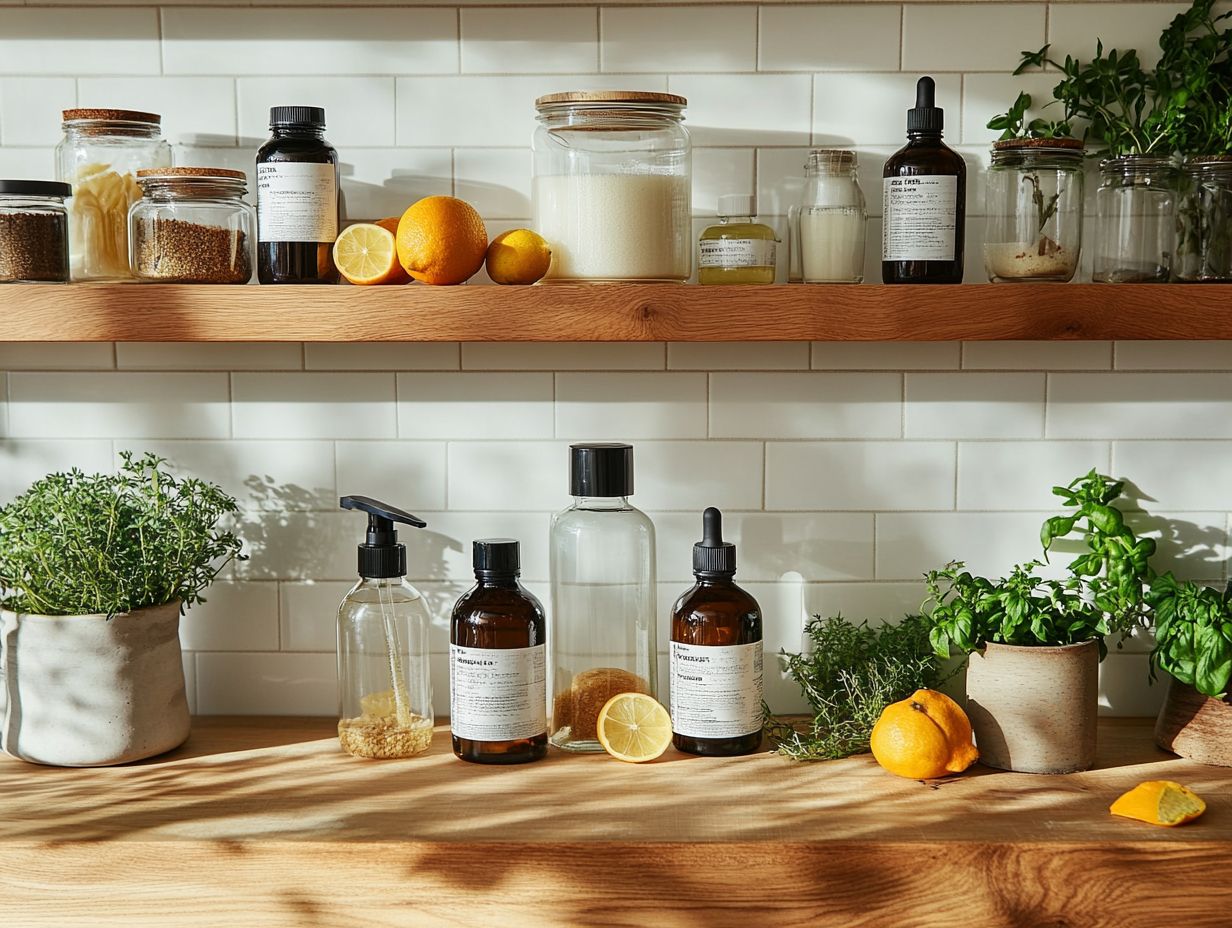
Can natural cleaners be stored for long periods of time?
Yes, natural cleaners can be stored for long periods if properly preserved. Utilizing adjustable cabinet shelving and vertical storage options can help you organize cleaning supplies efficiently.
What is the best way to store natural cleaners and under-the-sink solutions?
The best way to store natural cleaners is in airtight containers in a cool, dry place away from direct sunlight. Using transparent containers can help in quickly identifying the contents, thus maximizing efficiency.
Can I mix different natural cleaners or chemical-based cleaning products together for storage?
No, it is not recommended to mix different natural cleaners together for storage as it can affect their effectiveness and potency. Consider keeping a cleaning product inventory to avoid any mix-ups.
How can I prolong the shelf life of natural cleaners?
To prolong the shelf life of natural cleaners, you can add a few drops of essential oils with antimicrobial properties like tea tree or lavender to the storage container. This can be particularly useful in DIY non-toxic cleaning solutions.
Is it safe to store natural cleaners in plastic containers?
It is not recommended to store natural cleaners in plastic containers because the chemicals in the plastic can leach into the cleaner, affecting its potency and potentially causing harm when used. Instead, opt for glass containers or portable cleaning caddies for easy access.
Are there any natural preservatives I can use for my homemade cleaners?
Yes, natural preservatives such as white vinegar, citric acid, and grapefruit seed extract can be added to homemade cleaners to prolong their shelf life. Vinegar and baking soda are also great choices for enhancing the effectiveness of natural cleaning products.
Try these tips and share your own experiences with natural cleaners!

